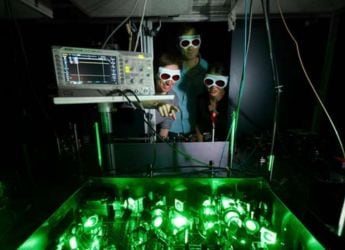- Home
- Science
- Science News
- Nobel Prize in Chemistry 2021: Benjamin List, David MacMillan Win for Work on Molecular Construction
Nobel Prize in Chemistry 2021: Benjamin List, David MacMillan Win for Work on Molecular Construction
Nobel Prize in Chemistry this year was awarded for “development of a precise new tool for molecular construction: organocatalysis.”

Photo Credit: Nobel Prize Outreach
(L-R) Nobel Prize in Physics 2021 laureates Benjamin List and David W.C. MacMillan
Germany's Benjamin List and David MacMillan of the United States on Wednesday won the Nobel Prize in Chemistry for their development of a precise new tool for molecular construction, the jury said.
The duo was awarded "for their development of a precise new tool for molecular construction: organocatalysis. This has had a great impact on pharmaceutical research, and has made chemistry greener," the Nobel Committee said.
List and MacMillan, both 53, will share the SEK 10 million (roughly Rs. 8.5 crores) prize.
MacMillan is a professor at Princeton University in the US, while List is a director at the Max Planck Institute in Germany.
"Many research areas and industries are dependent on chemists' ability to construct molecules that can form elastic and durable materials, store energy in batteries or inhibit the progression of disease," the Nobel Committee at the Royal Swedish Academy of Sciences said in a statement.
"This work requires catalysts, which are substances that control and accelerate chemical reactions, without becoming part of the final product," it added, noting that prior to the work of the laureates, scientists believed there were only two types of catalysts, metals and enzymes.
In 2000, the researchers, working independently of each other, developed a third type, called "asymmetric organocatalysis", which relies on small organic molecules.
Ahead of this year's announcement, analysts said the field was wide open.
According to Clarivate, which maintains a list of potential Nobel Prize winners, more than 70 researchers had what it takes to be considered for the prize in chemistry, given the thousands of citations they have received in scientific papers.
Last year, the Nobel went to Frenchwoman Emmanuelle Charpentier and American Jennifer Doudna, for developing the gene-editing technique known as CRISPR-Cas9 — DNA snipping "scissors".
The Nobel season continues on Thursday with the much-anticipated prize for literature and with peace on Friday before the economics prize winds things up on Monday, October 11.
Catch the latest from the Consumer Electronics Show on Gadgets 360, at our CES 2026 hub.
- Samsung Galaxy Unpacked 2025
- ChatGPT
- Redmi Note 14 Pro+
- iPhone 16
- Apple Vision Pro
- Oneplus 12
- OnePlus Nord CE 3 Lite 5G
- iPhone 13
- Xiaomi 14 Pro
- Oppo Find N3
- Tecno Spark Go (2023)
- Realme V30
- Best Phones Under 25000
- Samsung Galaxy S24 Series
- Cryptocurrency
- iQoo 12
- Samsung Galaxy S24 Ultra
- Giottus
- Samsung Galaxy Z Flip 5
- Apple 'Scary Fast'
- Housefull 5
- GoPro Hero 12 Black Review
- Invincible Season 2
- JioGlass
- HD Ready TV
- Laptop Under 50000
- Smartwatch Under 10000
- Latest Mobile Phones
- Compare Phones
- Red Magic 11 Air
- Honor Magic 8 RSR Porsche Design
- Honor Magic 8 Pro Air
- Infinix Note Edge
- Lava Blaze Duo 3
- Tecno Spark Go 3
- iQOO Z11 Turbo
- OPPO A6c
- Lenovo Yoga Slim 7x (2025)
- Lenovo Yoga Slim 7a
- Lenovo Idea Tab Plus
- Realme Pad 3
- Moto Watch
- Garmin Quatix 8 Pro
- Haier H5E Series
- Acerpure Nitro Z Series 100-inch QLED TV
- Asus ROG Ally
- Nintendo Switch Lite
- Haier 1.6 Ton 5 Star Inverter Split AC (HSU19G-MZAID5BN-INV)
- Haier 1.6 Ton 5 Star Inverter Split AC (HSU19G-MZAIM5BN-INV)


![[Sponsored] Haier C90 OLED TV | Dolby Vision IQ, 144Hz OLED and Google TV in Action](https://www.gadgets360.com/static/mobile/images/spacer.png)









